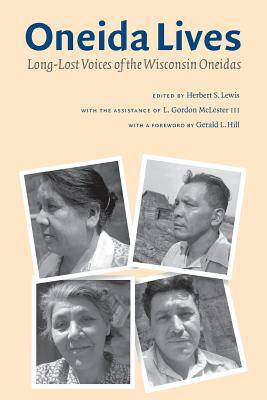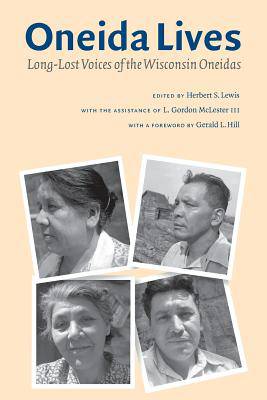
- Afhalen na 1 uur in een winkel met voorraad
- Gratis thuislevering in België vanaf € 30
- Ruim aanbod met 7 miljoen producten
- Afhalen na 1 uur in een winkel met voorraad
- Gratis thuislevering in België vanaf € 30
- Ruim aanbod met 7 miljoen producten
Zoeken
Oneida Lives
Long-Lost Voices of the Wisconsin Oneidas
€ 45,95
+ 91 punten
Omschrijving
In this intimate volume the long-lost voices of Wisconsin Oneida men and women speak of all aspects of life: growing up, work and economic struggles, family relations, belief and religious practice, boarding-school life, love, sex, sports, and politics. These voices are drawn from a collection of handwritten accounts recently rediscovered after more than fifty years, the result of a WPA Federal Writers' Project undertaking called the Oneida Ethnological Study (1940-42) in which a dozen Oneida men and women were hired to interview their families and friends and record their own experiences and observations. Selected from more than five hundred biographical narratives, these sixty-five chronicles, told by fifty-eight women and men, present a picture of Oneida Indian life from the 1880s, before the Dawes Allotment Act, through World War I and the Great Depression, to the beginning of World War II. Despite the narrators' struggles against harsh economic conditions, the theft of their land, and neglect, their firsthand histories are rendered with frankness and wit and present a remarkable picture of an era and a people.
Specificaties
Betrokkenen
- Uitgeverij:
Inhoud
- Aantal bladzijden:
- 428
- Taal:
- Engels
- Reeks:
Eigenschappen
- Productcode (EAN):
- 9780803280434
- Verschijningsdatum:
- 1/11/2005
- Uitvoering:
- Paperback
- Formaat:
- Trade paperback (VS)
- Afmetingen:
- 149 mm x 214 mm
- Gewicht:
- 535 g

Alleen bij Standaard Boekhandel
+ 91 punten op je klantenkaart van Standaard Boekhandel
Beoordelingen
We publiceren alleen reviews die voldoen aan de voorwaarden voor reviews. Bekijk onze voorwaarden voor reviews.










